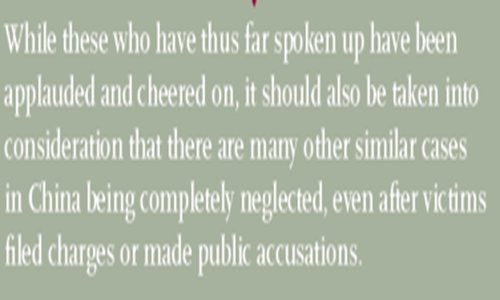

Silence breakers in China face hostile legal and cultural environment
○ The suspension of a Beijing university professor came after weeks of united calls and reports about his constant sexual harassment.
○ Yet numerous other sexual harassment cases in China are being neglected or mishandled by authorities.

Many Chinese women are under threat of sexual harassment from their teachers on campus. Photos: IC
Upon hearing the recent news that Chen Xiaowu, a professor at Beihang University (previously known as Beijing University of Aeronautics and Astronautics) (BUAA), was finally disqualified by school authorities due to numerous sexual assault charges made against him, Luo Xixi could finally breathe again.
The Chinese woman, who now lives in the US, revealed last October how Chen had sexually assaulted her 12 years ago, when she was a student in Beijing. Together with others with similar complaints (who chose to remain anonymous), Luo pushed for his expulsion for over four months.
Following the uproar, China's Ministry of Educationdeclared that authorities will look into a mechanism that prevents sexual assault on campuses. However, this is only one battle won in a larger war against sexual harassment at Chinese schools. Even though such cases are in fact quite common in China, most victims choose not to expose their harassers, and the few who do often find their voices quickly squelched in the process.
"Me too"
It all began on the morning of October 13, 2017, just as Luo was leaving for work, her husband asked her whether she had read the big news about Hollywood. She picked up her phone and found out that legendary movie producer Harvey Weinstein had been accused of sexual harassment by multiple actresses. Soon after, American actress Alyssa Milano launched the "#metoo" hashtag movement on social media.
"I told myself, 'Me too!' then I took a deep breath," Luo later wrote on China's Twitter-like microblog Weibo. That same day, she also happened to read an anonymous post online saying Beijing university professor Chen Xiaowu had been accused of sexually assaulting students. She couldn't believe that, after all these years, somebody was brave enough to expose him.
Two days later, Luo wrote about her own experience with Chen and posted it online. In 2004, while a student, Chen had asked her to his home under the pretense of taking care of his flowers. After locking the door behind her, Chen told Luo he had a tense relationship with his wife. The professor then attempted to rape Luo. She began to cry, which then made Chen stop.
Over the next few years at school, Luo was treated terribly under Chen and was put on medication by doctors after suffering from depression.
Sexual harassment is quite common on Chinese campuses. In 2016, Wei Tingting, founder of the Guangzhou Gender and Sexuality Education Center, wrote a report about sexual harassment in Chinese colleges, based on an online survey collected over one month among 6,592 respondents. The results showed that 68 percent of students had encountered degrees of sexual harassment at various levels.
After posting her story, Luo began receiving messages from other current or former BUAA students who claimed to also have been harassed by Chen. One said that Chen had called her his "girlfriend," and another said Chen forced students in his team to go out drinking with him.
Luo soon created a WeChat group called "Hard Candy," taking the name from a 2005 American movie starring Ellen Page as a girl who takes bloody revenge against a pedophile. So began Luo's journey to uphold justice. But it has been an arduous path, as many refused to stand up alongside her out of fear of retaliation from the accused or, even worse, mistreatment from school authorities.

Swept under the rug
Luo assembled mobile phone screenshots and recordings she received from other victims proving Chen's sexual harassment and also got in touch with members of the disciplinary committee at BUAA. She felt relieved.
But almost instantly, there came repercussions. Some posts on Weibo and WeChat concerning Chen were mysteriously deleted. Chen also phoned the woman who had provided the phone recordings to Luo and threatened her, saying he was a candidate to become vice dean of BUAA.
In January, Luo and Huang decided to publicly disclose their information. But soon thereafter, more posts published on the ATSH (anti-sexual harassment) WeChat account were also deleted.
Among the disappeared posts was a joint letter written by BUAA students demanding that an anti-sexual harassment mechanism be established on campus. It included specific suggestions included regulations, lectures, training, punishment and even psychological consulting centers.
In previous cases, some women experienced pressure from school authorities hoping to suppress their accusations before it could ruin the school's reputation.
Last May, for instance, a netizen wrote on Sina Weibo that his friend, who once was a student at Beijing Film Academy had been sexually assaulted by the father of her teacher. The academy's official Weibo responded to the accusations with a post saying, "this student has had depression since middle school and attempted suicide during college. The academy investigated and found no such incident as described."
Two years ago, a student at Nanjing Post and Telecommunications University killed himself after long-term emotional abuse from his mentor.
After his death, a classmate wrote a post saying she too was often harassed by the same mentor. But when she told this to her school counselor, she was instructed to remain quiet and that "this will not do you any good if it blew up."
Trying to speak up
Unlike in the US and Europe, where the #metoo movement soon swept through society like a tornado, in China the movement was more like a gentle summer breeze.
The first obstacle was to get other women to speak up on the matter. One accuser on the Hard Candy chat group using the pseudonym "C" only spoke a few times at the beginning, then stopped responding to Luo.
"I understand her silence though. If you've been hurt that greatly, how can you speak up easily?" Luo wrote on Weibo.
Luo herself had kept silent for 12 years. In fact, after the attempted rape by her BUAA professor, she immediately told her parents, who said they thought it was too "shameful" to make it a public issue. They also believed that Chen could easily kill Luo's future career, so she agreed with them to keep quiet. In China's colleges, professors have a strong voice in determining the students' graduation.
Huang Xueqin, a former journalist and the founder of ATSH WeChat account, told the Global Times that it is difficult for women to speak up because Chinese society is relatively conservative, with many often questioning the victim rather than the accused. At the same time, sexual harassment is extremely hard to prove in a Chinese court of law.
It wasn't until 2016, when an intern had been harassed by her boss at Southern Daily newspaper and people started victim-blaming, did Huang decide to openly talk about her own experience. She then began conducting a questionnaire among other media workers on sexual harassment.
"The #metoo anti-sexual harassment campaign supporting victims has been going on all over the country, but here it's all quiet," she wrote in her first article published on ATSH. "I know it's quiet not because we don't have similar problems, it's that we dare not, will not and even do not want to talk about it."
No legal definition
Legally, there is no definition of sexual harassment in China. The Law on Protection of Rights and Interests of Women first expanded to include sexual harassment in 2005, but never gave a clear definition or boundary.
The Ministry of Education issued a regulation in 2014 forbidding teachers from sexually assaulting students or conducting improper behavior, but it also did not specify how to handle such cases or state the school's responsibility.
Fortunately, the #metoo movement seems to be slowly seeping into collective Chinese consciousness. The day after Chen's disqualification, another woman accused a teacher at Beijing's University of International Business and Economics of sexual harassment. The school promised to "look into the matter."
While these who have thus far spoken up have been applauded and cheered on, it should also be taken into consideration that there are many other similar cases in China being completely neglected, even after victims filed charges or made public accusations.
Among those schools who have assured the victims that they would "look into it," few actually have.
At Beijing Film Academy, the victim's Weibo posts have been deleted. In 2016, a student wrote an investigative article about sexual harassment at Beijing Normal University, especially about a specific professor there. The school's disciplinary committee "promised to look into matters," but didn't.
Wei said there is almost no precedent in China on how to deal with sexual harassment cases, as no legal, administrative or even ethical mechanisms are in place.
During a public data search of disclosed government records, she found only three complaints or reports about sexual harassment incidents recorded among 113 colleges in China in 2016. Only 13 Chinese colleges replied that they have ever held sexual harassment prevention education. And not a single university or college in China has a dedicated department, or even dedicated procedures, to handle sexual harassment incidents.
"We hope there can be not only punishment, but more education, in Chinese schools when dealing with such cases," Wei said. "There needs to be education that teaches men to respect women, and teaches women to learn to protect themselves."

 Award-winning photos show poverty reduction achievements in NE China's Jilin province
Award-winning photos show poverty reduction achievements in NE China's Jilin province People dance to greet advent of New Year in Ameiqituo Town, Guizhou
People dance to greet advent of New Year in Ameiqituo Town, Guizhou Fire brigade in Shanghai holds group wedding
Fire brigade in Shanghai holds group wedding Tourists enjoy ice sculptures in Datan Town, north China
Tourists enjoy ice sculptures in Datan Town, north China Sunset scenery of Dayan Pagoda in Xi'an
Sunset scenery of Dayan Pagoda in Xi'an Tourists have fun at scenic spot in Nanlong Town, NW China
Tourists have fun at scenic spot in Nanlong Town, NW China Harbin attracts tourists by making best use of ice in winter
Harbin attracts tourists by making best use of ice in winter In pics: FIS Alpine Ski Women's World Cup Slalom
In pics: FIS Alpine Ski Women's World Cup Slalom Black-necked cranes rest at reservoir in Lhunzhub County, Lhasa
Black-necked cranes rest at reservoir in Lhunzhub County, Lhasa China's FAST telescope will be available to foreign scientists in April
China's FAST telescope will be available to foreign scientists in April